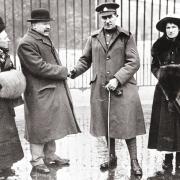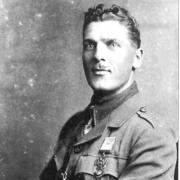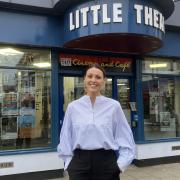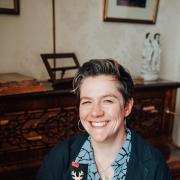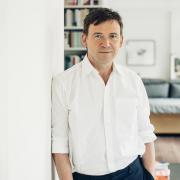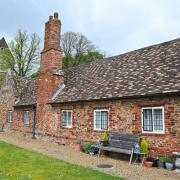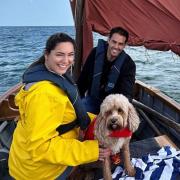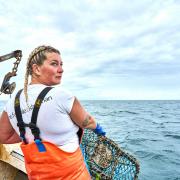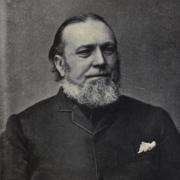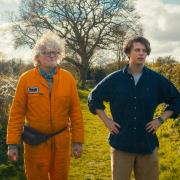Last year, ITV arts editor Nina Nannar lost her husband, Steve Ronson, from complications associated with kidney disease. Here she talks candidly about grief, raising awareness in his memory and the places in Norfolk which have brought her comfort.
Listening to Nina Nannar telling the story of how she met her husband, Steve Ronson, it sounds like a real-life rom com.
‘Bizarrely we got to know each other at Machu Picchu,’ says ITV News' arts editor. ‘We were both on the same charity trek and I had seen him at the airport but hadn’t really spoken much to him. Then we went up this mountain where there wasn’t much oxygen and I managed to keep talking all the way through the trek.'
It was a classic case of opposites attract.
‘He was very quiet, very thoughtful, thought about what he was going to say. Didn’t speak unless it was relevant and he had a point to make. I am the exact opposite of that, which probably makes me a fairly good journalist because I do like talking. A nice, gentle, outdoor, spiritual, meditative man.'
As they got to know each other and fell in love, he told Nina about the health problems he had had while growing up in New Zealand. He was born with a kidney condition called reflux, a problem with a valve in the ureter that allows urine to travel the wrong way, from the bladder back into the kidney. If untreated, it causes the body to fill up with toxins.

‘Fifty years ago it just wasn’t spotted. His mother knew instinctively there was something, but they couldn’t get a diagnosis until the toxins overpowered his body and he nearly died,’ she says.
Steve underwent dialysis to clean his blood for eight hours a day for about three and a half years, then had a kidney transplant when a perfect match was found.
Having had his life put on hold during his teens made Steve, who became a garden designer, determined to make the most of every day.
Donor kidneys usually last for 15-20 years. In 2009, when he, Nina and daughter Mimi were living in London, came the news that his kidney was starting to fail and he would have to go back on dialysis.
So to prioritise Steve’s health and de-stress their lives, in 2011 they relocated to Norfolk, a place they had grown to love, with Nina commuting to work from their home in Norwich.
‘We moved to Norfolk to have fresh air and I think it was the right thing to do, his kidney just lived a lot longer until it was time for the second transplant.
‘That second round of dialysis was a real slog, dialysis is a slog, even when it’s not a slog, it’s a slog.
'To the outside world many people didn’t really know what was going on, but that’s the way he wanted it and so that’s the way we played it.
‘Even though he was dialysing, life was still lovely, we were together, he was alive, we were still able to do some stuff, he was still able to do his gardening, he was still everyone’s handyman. We’re so lucky that he was in our life. Mimi and I both think that.’
In 2016 Steve got a call from Addenbrookes hospital to say that they had a kidney which was a match for him and he had a second transplant, 32 years after his first.
‘The kidney was really doing its job, but the thing about having a transplant, and medication has improved over the years, is that you need to take a certain kind of medication to stop your body rejecting that organ, and that has side effects,’ says Nina.
And for Steve, one of those was skin cancer. He would regularly see a dermatologist to have lumps on his back checked and treated.
But after lockdown, the lumps started getting bigger and cancerous cells were detected.
Then more started to appear on his ear, which had to be removed - and then came the news that the cancer had spread to his brain.
But, says Nina, Steve remained optimistic in the face of the devastating diagnosis and the pain he was in.
‘I just remember what he said to the consultant – he said that he’d been there before, and he was a realist but also an optimist – and that summed him up. We’d got used to squeezing life out of life and that’s what we were doing.’
Steve died in May 2022, aged 60. As well as having Nina and Mimi there, he had the added comfort that his sister had moved to Norfolk 18 months previously to be closer to him.
‘It was quite shocking and sudden,’ says Nina. ‘And then we were just surrounded by love. My family came over from Canada and the house was full. My friends from work were at my house within days.’
Steve’s funeral was held at Colney Wood and included a reading by Mimi, who was a Young Laureate of Norfolk at the time, of a poem she’d written, followed by a wake at their local pub, the William and Florence in Norwich.
‘Mimi, who was 17 at the time, wrote a beautiful poem and said that she wanted to read it. It was absolutely extraordinary, I was so proud of her. And the funeral was deeply sad, but it was a strangely beautiful day and it ended up being very celebratory, and everyone came back to our house, we played music and everybody was dancing around our kitchen at midnight. It was so perfect, and it happened so naturally.’
For the next six months, Nina describes her and Mimi being in ‘a daze’, her grief striking at unexpected moments, such as realising that Steve wasn’t going to be coming downstairs to watch TV with her.
‘And that’s when it’s really difficult. I’ve got loads of friends and my daughter, but it was really lonely and very real,” she says.
Steve loved Christmas, decorating the house and putting up the tree, so for their first one without him, Nina and Mimi went to stay with her brother in Vancouver.
She says that work was ‘unbelievable...so supportive’ and when the time was right she started a phased return.
A major milestone was travelling to LA to cover the Oscars, which she does every year.
'That was a massive moment for me, a lovely producer and the camera crew really looked after me and I felt an amazing sense of achievement. But also I thought about how Steve always met me at the station and drove me back home and I think it just overwhelmed me that he wasn’t there,’ she says.
We will all go through bereavement at some point, which is why Nina believes that is so important that we talk about grief.
‘I was asked to go on The Widow’s Podcast, and I suddenly realised that’s what I am now, I’m a widow. It was really tearful, but hopefully it was helpful and it was honest because we don’t talk about death much do we in this country? And it does help to talk about it I think.’
You can hear the pride in Nina's voice when she talks about Mimi, who has just finished her A levels and is planning to take a year out.
‘Because I worked in London half the week, she and her dad were a unit, they had a very special relationship and losing him was really hard for her. I can’t tell you how proud I am of my daughter for her strength.’

The family dog, greyhound Tommy, has become a huge comfort to them both.
'He used to sleep in a bed at the bottom of our bed and after Steve died I would get up out of my side of the bed and go downstairs and Tommy would sit and wait, sometimes for three hours, wondering why Steve hadn’t got out of his side of the bed. That went on for months, he really did grieve and then I think it dawned on him that Steve wasn’t coming home and then he comforted Mimi and I.’
She and Mimi have been scattering Steve’s ashes in places which are special to them as a family – Latitude festival, which they went to every year, and off the Norfolk coast - Waxham and Blakeney are particularly special places. They also plan to take some back to New Zealand next year.
And they talk about him all the time to keep him with them.
‘Whenever the sun shines now, we call it a Steve Ronson day because he would go "sun’s up, Steve’s on the up" because he was a real sunshine man, he really was - he loved the bright weather,’ says Nina.
Nina and Mimi are members at Fritton Lake – which is where we meet. It's a place that she and Steve had looked into joining.
‘Sometimes it was a bit difficult to be at home and we’ve had a number of occasions where we’ve had a particularly sad day and we’ve just packed the dog in the car, we’ve driven up and we’ve stayed here and it’s become a bit of an escape thing for us, it’s really helped in our recovery.
‘When I come here I feel comforted – with the lake and everything it’s a real Steve Ronson place.’
Keeping busy is also helping her.
Nina is throwing herself into projects that are dear to her – she is one of the founding trustees of the Young Norfolk Arts Trust, a patron of the domestic abuse charity Leeway and a board member of the National Centre for Writing. She also works with the Prince’s Trust and the British Asian Trust.
And as an ambassador for Kidney Research UK she hosted a fundraising gala for former footballer Andy Cole, who has had a kidney transplant himself.
That research is making huge advances.
‘We just got on with life with a kidney patient and since he died, strangely, it’s become a much bigger thing in my life,’ says Nina.
‘I couldn’t give Steve one of my kidneys, because I’m Indian and our blood types are different and now they’re working on this research that potentially means that you don’t have to have the same blood type. It’s an absolute game-changer. It didn’t happen in time for Steve, but it needs to happen in time for everyone else,’ she says.
As well as the Oscars, this year Nina has already covered the Coronation Concert at Windsor and the Eurovision Song Contest in Liverpool, where she was the first journalist to interview Loreen after her win and has travelled to Bulgaria to film a documentary about fire walking. She’s also resumed her podcast, Unscripted, and interviewed one of her heroes, Eric Cantona. She’s even found herself on the Latitude line-up herself, in conversation with Charlie Mackesy, the Oscar-winning writer of The Boy, the Mole, the Fox and the Horse.
‘That was a real thrill and Steve would have laughed his head off at that,’ says Nina.
‘Saying yes is a really big part of the recovery and I’m not great at it, but I’m getting there. I’m playing a festival, that’s the power of saying yes, isn’t it?’
To find out more about the work of Kidney Research UK, visit kidneyresearchuk.org
Nina’s podcast, Unscripted, which features interviews with the likes of Damian Lewis, Eric Cantona and Eurovision winner Loreen is available on platforms including Apple Podcasts and Spotify.





